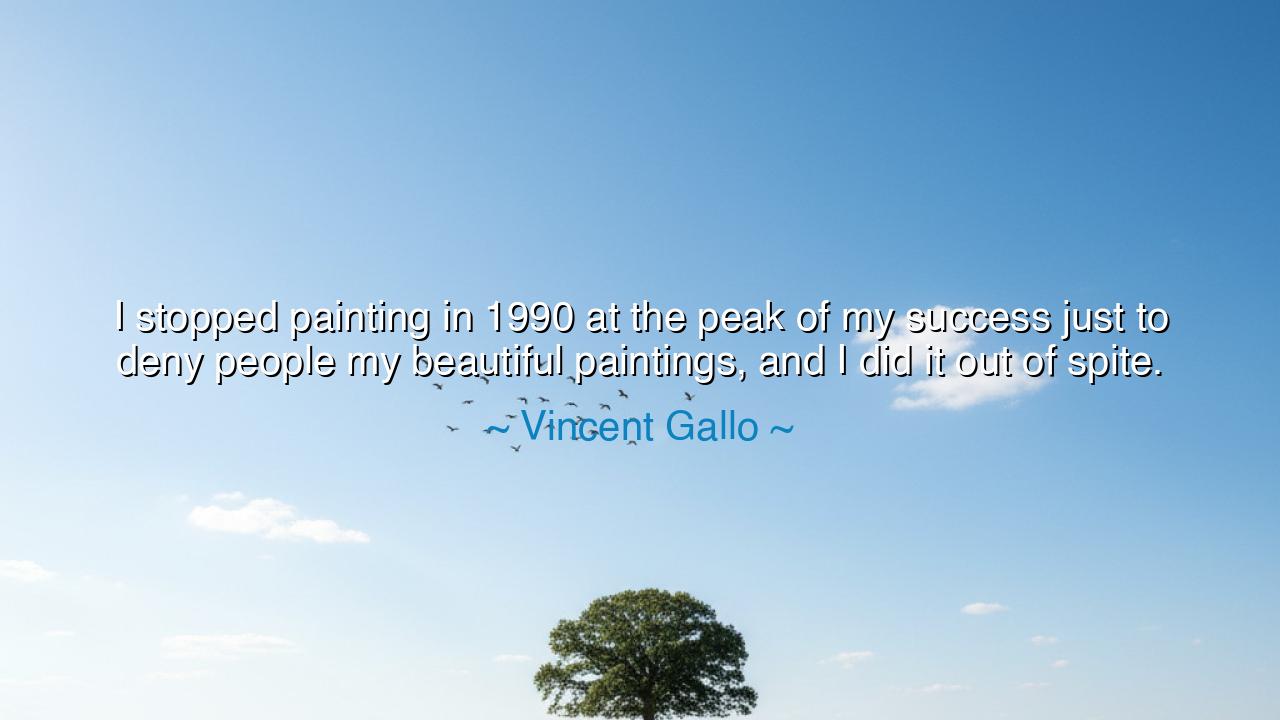
I stopped painting in 1990 at the peak of my success just to
I stopped painting in 1990 at the peak of my success just to deny people my beautiful paintings, and I did it out of spite.






The restless spirit of the artist, Vincent Gallo, once confessed: “I stopped painting in 1990 at the peak of my success just to deny people my beautiful paintings, and I did it out of spite.” These words strike like a storm, raw and uncompromising, and they reveal a darker truth about the soul of creation. For in them lies the tension between the artist and the world: the artist gives birth to beauty, yet feels unappreciated, misunderstood, or even exploited by those who consume it. Gallo’s act was not the surrender of a tired man, but the defiant rebellion of one who wished to remind the world that his gift was his alone to grant or to withhold.
The ancients understood this paradox. The poet Archilochus, when scorned, declared through his verses that he would rather destroy his enemies with words than seek their praise. Likewise, Diogenes the Cynic, who spurned the comforts of society, taught that to deny the crowd what it craves is itself an act of power. Gallo’s refusal to paint was not merely an ending—it was a statement, a declaration of sovereignty over his own genius. By denying the world his art, he sought to show that beauty is not a commodity to be demanded, but a gift that comes only at the artist’s will.
This struggle is echoed in the story of Arthur Rimbaud, the French poet who, at the height of his creative power, abandoned poetry altogether before the age of twenty-one. Like Gallo, he walked away at his peak, not from lack of talent, but from disdain—for the critics, the public, and perhaps for the art itself as it was received. His silence became as powerful as his words. The world, robbed of more works, was forced to revere the few he left behind. In the same way, Gallo’s choice turned his paintings into legend, treasures sealed away by deliberate withdrawal.
There is also a warning in his words: success can twist the relationship between artist and audience. When the artist feels that the crowd sees only the surface—beauty, profit, fame—while ignoring the soul beneath, resentment festers. Success, instead of nourishing, becomes poison. Gallo’s spiteful act was not against art itself, but against a world he felt unworthy to receive it. In this, his defiance reminds us that art is not born for consumption, but for expression. When expression is misused, the artist may choose silence as his last form of power.
Yet even in his spite, there is a strange nobility. For by refusing to give what others demanded, Gallo asserted the dignity of the creator. He reminded us that art cannot be bought by applause or dragged forth by hunger. It is a fragile flame, and only when tended in freedom does it burn bright. The artist has the right to guard that flame—even if it means denying the world its warmth. In this way, his act was a lesson, though born of bitterness: the artist must never surrender sovereignty over his own creation.
The lesson for us is this: do not take for granted the gifts of others, nor demand from them endlessly without gratitude. To consume without reverence is to risk losing what is most precious. Whether it is art, wisdom, or labor, remember that behind every offering stands a human soul. Show respect, lest that soul withdraw and deny you its light. For the greatest treasures are not owed to us—they are bestowed.
Practically, this means cultivating humility when we encounter greatness. When you listen to music, behold art, or read words that stir your spirit, honor the maker. Do not treat their work as a product alone, but as a fragment of their being. And in your own creations, guard your sovereignty fiercely. Do not let the hunger of others dictate the rhythm of your gift. Share when you are ready, and withhold when your spirit requires.
Thus, let Vincent Gallo’s words endure not only as a cry of spite, but as a reminder of the sacredness of creation: to give is power, but to withhold is also power. Success may bring applause, but only integrity preserves the soul. In the end, beauty belongs first to the creator, and the world must learn reverence, lest the artist close his hands and vanish into silence.






AAdministratorAdministrator
Welcome, honored guests. Please leave a comment, we will respond soon